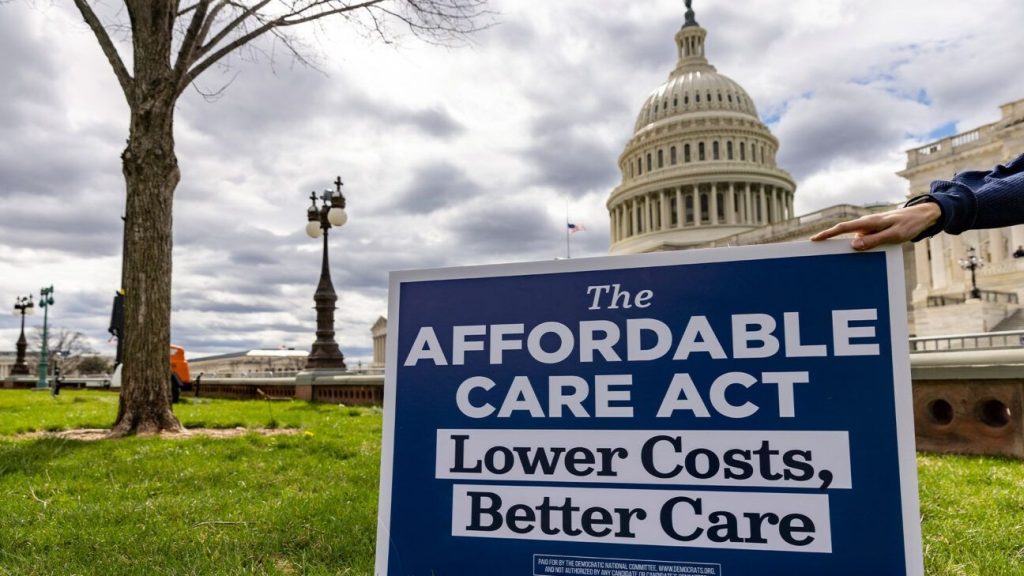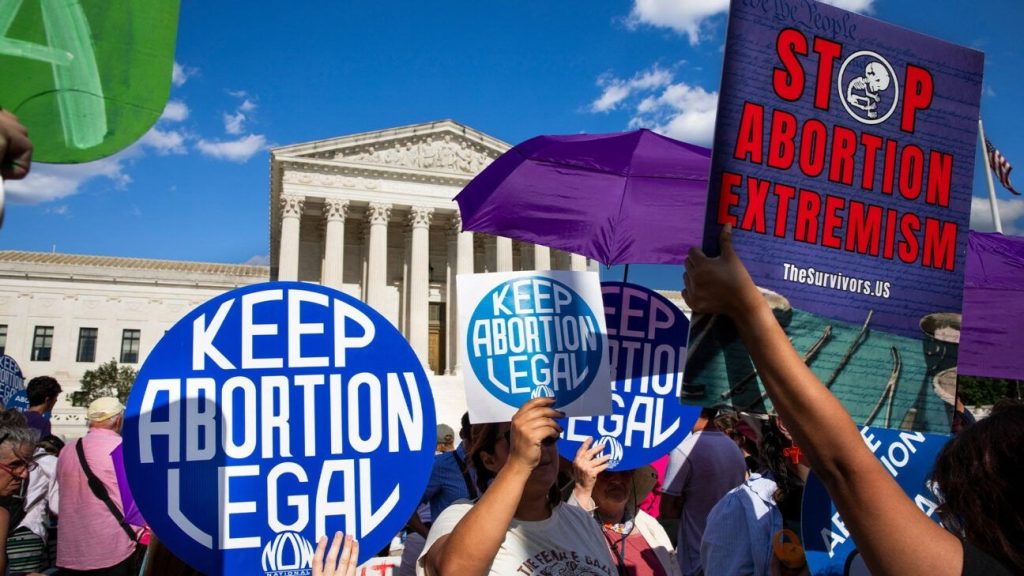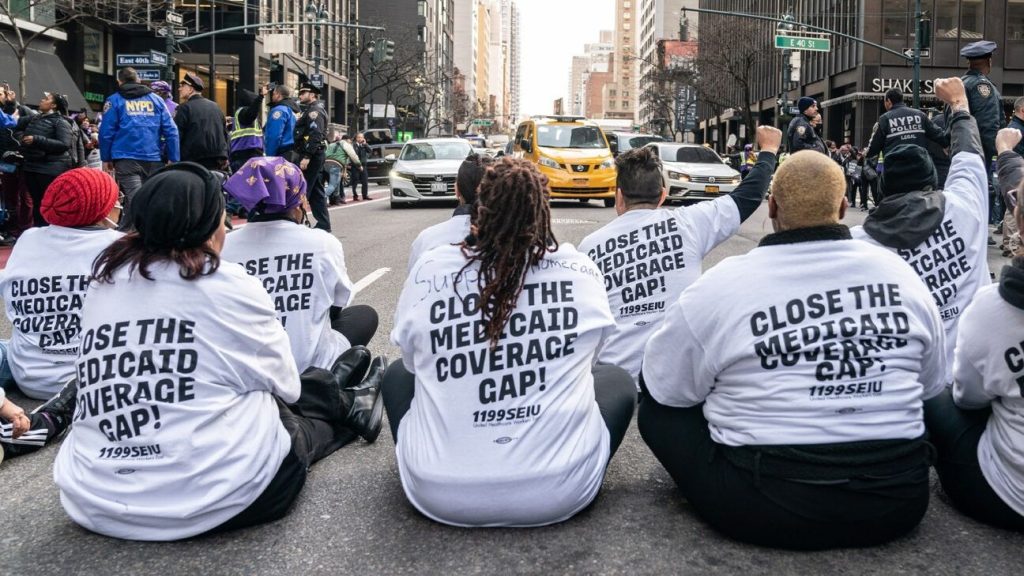The state of healthcare in the United States has reached a pivotal moment, with key topics like the Affordable Care Act (ACA) and prescription drug costs taking center stage in the current presidential election.
A recent report from the Commonwealth Fund, released in mid-September, reveals that the U.S. ranks last among ten developed countries in healthcare performance. The findings highlight that the U.S. experiences the highest rates of avoidable deaths and a greater number of premature fatalities compared to the other nine nations evaluated.
Democratic presidential candidate Kamala Harris and Republican presidential candidate Donald Trump offer contrasting strategies for addressing the nation’s pressing healthcare challenges.
Harris outlines her positions on various issues on her campaign website, while Trump details his healthcare approach through his 20 Core Promises and Agenda 47 campaign platforms.
To assist voters in understanding each candidate’s stance on seven critical healthcare issues as they prepare to cast their ballots, Healthline presents a summary of their positions along with expert analyses of how their differing approaches may influence the future of healthcare.
Affordable Care Act (ACA)

Enacted in 2010 by former President Barack Obama, the Affordable Care Act (ACA), widely known as Obamacare, established a marketplace for individuals to purchase health insurance with relatively affordable monthly premiums.
The ACA mandates that insurance companies must cover individuals with preexisting conditions, including pregnancy, without imposing additional costs. It also permits young adults to remain on their parents’ insurance until they turn 26 and requires that all individuals have some form of health insurance, or face a financial penalty for noncompliance.
Kamala Harris’s Position
Vice President Kamala Harris is a staunch supporter of the ACA and has pledged to both expand and enhance it. During her time in the Senate, she voted against attempts by then-President Trump to repeal the law. Harris has emphasized her goal of making affordable healthcare a fundamental right rather than a privilege.
Under the Biden-Harris administration, enrollment in the ACA reached unprecedented levels in 2024, with over 20 million people obtaining coverage. Harris backed President Biden’s initiatives to extend the enrollment period and implement programs that enable lower-income families to secure plans at little to no cost. Some of these programs are set to expire in 2025, and Harris has indicated her intention to work on their renewal.
Donald Trump’s Position
Former President Donald Trump made several attempts to dismantle the ACA during his tenure. He successfully eliminated the financial penalty for individuals who chose not to obtain health insurance, allowing those who opted out to do so without incurring fees. Additionally, he extended the duration of short-term insurance plans from three months to one year, which offered lower premiums but often excluded coverage for individuals with preexisting conditions.
Trump also reduced funding for outreach and marketing efforts related to ACA programs, resulting in decreased enrollment figures. In his current campaign, Trump has promised to replace the ACA with a “better, stronger, and less expensive” system. However, he has yet to provide concrete details on how he plans to achieve this, merely alluding to having “concepts of a plan” during the September 10 presidential debate.
Expert Opinions on the Candidates’ Healthcare Policies
Healthcare reform expert Rosemarie Day, founder and CEO of Day Health Strategies, asserts that support for the ACA has grown significantly due to its protections for individuals with preexisting conditions, one of its most valued features. She warns that repealing the ACA would have dire consequences for millions of Americans who rely on its subsidized coverage and protections.
“Millions would find themselves uninsured, leading to increased mortality from manageable or preventable illnesses,” Day stated. She believes that instead of replacement, the ACA should be strengthened and enhanced.
Harris’s support for extending the marketplace subsidies established during the pandemic is seen as a crucial step in maintaining health coverage for millions. “This ensures that those with current health insurance can continue their coverage, promoting better health outcomes,” Day explained.
Dr. Kanwar Kelley, co-founder and CEO of Side Health, agrees that expanding the ACA could lead to more affordable plans and help bridge the healthcare gap for low-income individuals. He notes that Trump’s attempts to undermine the ACA during his presidency contributed to rising costs.
“Health insurance relies on the participation of younger, healthier individuals to balance out the system,” Kelley explained. “By removing the individual mandate, Trump’s administration allowed many to forgo insurance, which increased premiums for those who remained insured.”
Kelley also highlighted that cuts to marketing and outreach under Trump diminished enrollment numbers, resulting in higher premiums. “The ACA addresses healthcare disparities by providing coverage for those previously excluded due to chronic conditions or financial barriers. Trump’s repeated attempts to repeal the law, without a viable alternative, could endanger the insurance of millions and exacerbate existing disparities,” he concluded.
Abortion

As the 2024 presidential election approaches, few issues ignite as much controversy as abortion.
The debate intensified in 2022 when the U.S. Supreme Court upheld a stringent Mississippi law regarding abortion in the landmark Dobbs decision, effectively overturning the constitutional protections established in the 1973 Roe v. Wade ruling.
In the two years since this decision, 41 states have implemented some form of abortion restrictions. Eleven states have limited abortion at the stage of fetal viability, as defined by Roe v. Wade, while another 14 have placed restrictions on abortions from the moment of conception.
Kamala Harris’s Position
Vice President Kamala Harris has expressed her commitment to safeguarding abortion rights by advocating for a federal law that would enshrine the protections once afforded by Roe v. Wade. Under this framework, states would only be allowed to restrict abortions after fetal viability, typically between 23 and 25 weeks of gestation.
Harris contends that the issue extends beyond access to abortion services. She has highlighted that current restrictions often deter medical professionals from providing critical emergency care for patients experiencing severe pregnancy complications, as they fear prosecution under state abortion laws.
Donald Trump’s Position
Former President Donald Trump has taken credit for the elimination of Roe v. Wade and has praised the Supreme Court, including the three justices he appointed, for transferring the authority over abortion regulations to state legislatures. During his administration, the Department of Health and Human Services removed funding from over 1,000 health centers that provided referrals for abortion services.
Trump has been evasive regarding whether he would support a national abortion ban, although he has stated that he favors exceptions in cases of rape, incest, or threats to the mother’s life. He has criticized some of the more extreme state laws, including those in his home state of Florida. Nevertheless, he indicated he would oppose a measure on the November ballot aimed at overturning Florida’s law, which prohibits abortions before fetal viability, generally considered to be between 22 and 24 weeks of pregnancy.
Healthcare Experts Weigh In
Healthcare experts have voiced concerns regarding the candidates’ positions on abortion. One expert noted, “Women’s health is being put at significant risk by the lack of access to abortion care and related health services.”
She added that even women showing early signs of miscarriage face delays in care in states with abortion bans due to physicians’ fears of legal repercussions for providing treatments that might be classified as abortions.
This situation has mobilized many individuals, potentially influencing the outcome of the 2024 election, especially in ten states where abortion-related measures will be on the ballot, including key swing states.
“In states where abortion has been on the ballot—seven thus far—voters have consistently chosen to protect women’s access to abortion,” the expert stated. “Many people understand that supporting reproductive health rights doesn’t necessarily mean endorsing abortion, but rather opposing government interference in personal health decisions.”
Despite the current momentum, there are growing concerns that conservatives may seek to implement a national abortion ban. While Trump remains non-committal about this issue, he has lost credibility with pro-choice voters, according to experts.
In contrast, Harris has pledged her support for national legislation to protect women seeking abortion care and has actively engaged with women affected by these laws, as well as families mourning losses due to inadequate abortion care.
“She is exceptionally credible on this issue,” the expert concluded, emphasizing Harris’s commitment to championing the rights of women facing these challenges.
Reproductive health

Reproductive health issues, including contraception and in vitro fertilization (IVF), are intricately linked to the abortion debate.
This connection was highlighted in February when the Alabama Supreme Court ruled that frozen embryos produced during IVF could be recognized as “children.”
Advocates for IVF have expressed concern that this ruling may deter fertility clinics from offering IVF treatments, fearing legal repercussions if frozen embryos are harmed or destroyed.
The topic resurfaced in mid-September when Senate Republicans blocked a bill aimed at establishing a nationwide right to IVF services.
Kamala Harris’s Position
Harris has committed to safeguarding Americans’ rights to access contraception and fertility services. She believes the Alabama ruling stems directly from the Supreme Court’s decision to overturn Roe v. Wade protections. After the Senate’s rejection of the IVF bill, she criticized “Republicans in Congress” for not ensuring access to the fertility treatments that many couples rely on to achieve their dream of parenthood. On her Facebook page in May, she stated, “Contraception is health care, and every person in America should have the freedom to access the health care they need.”
Donald Trump’s Position
Recently, Trump has expressed his intention to make IVF treatments free by either mandating that insurance companies cover these procedures or through federal funding, though he has not detailed how such a program would be financed. In May, he mentioned being “open” to regulating access to contraception. Shortly after, he clarified that he opposes a complete ban on contraception but may support restrictions that complicate access. During his presidency, he enacted policies that diminished access to contraception, such as allowing more companies to opt out of covering birth control in employee health insurance plans.
Expert Opinions on Candidates’ Reproductive Health Policies
Healthcare experts like Kelley have noted that while both Harris and Trump indicate support for expanding access to IVF, they lack detailed plans regarding the funding and insurance coverage needed for these services.
“Although there’s agreement on this issue, implementing IVF support may prove difficult, especially as embryo-protective laws, similar to Alabama’s, could proliferate under Republican governance,” Kelley remarked. He also pointed out that some physicians are hesitant to offer IVF-related treatments due to ambiguous regulations that might expose them to legal or even criminal liability.
Kelley further emphasized that limited access to contraception adversely impacts low-income households by restricting their access to family planning resources. Without supportive policies like paid family leave and other family-friendly programs, many families navigating the current economic challenges may face additional stress.
“In contrast, the Harris campaign has positioned reproductive health as essential healthcare, advocating for the right to contraception and comprehensive reproductive care. This approach aims to enhance access to services for women in low-income, rural, and minority communities,” Kelley concluded.
Maternal health

The state of maternal healthcare in the United States is far from satisfactory by many measures.
A report released by the Commonwealth Fund in June 2024 reveals that the U.S. maternal mortality rate stands at 22 deaths per 100,000 pregnancies, the highest among 14 affluent countries analyzed. Alarmingly, this figure is 55% higher than that of Chile, which has the second-highest rate.
The report highlights that Black women in the U.S. experience a maternal mortality rate that is more than double the national average.
Factors contributing to this high mortality rate include disparities in health insurance coverage and the utilization of midwives. The absence of paid family leave following childbirth further exacerbates the situation, hindering women’s access to essential follow-up care for pregnancy-related complications.
A study by the Centers for Disease Control and Prevention (CDC) indicates that approximately 80% of maternity-related deaths in the U.S. are preventable.
Moreover, the United States is one of only six countries globally that does not offer national paid family or maternity leave. Currently, 13 states and the District of Columbia have implemented laws that provide some form of paid family or medical leave.
Kamala Harris’s Position
Kamala Harris has been a leading voice in the Biden administration’s summer initiatives aimed at enhancing maternal health. These initiatives include establishing minimum safety standards for hospitals, improving training, ensuring readiness for emergency services, and implementing transfer protocols for obstetric patients.
She has highlighted that 47 states now provide Medicaid postpartum coverage for a full year, a significant increase from just three states offering this coverage in January 2021. Harris has committed to expanding paid family leave for new parents and those caring for sick relatives, proposing a nationwide extension of up to six months. Additionally, she has advocated for a $6,000 tax credit for parents of newborns.
Donald Trump’s Position
During his presidency, Donald Trump signed legislation allowing federal employees to take up to 12 weeks of paid maternity and paternity leave following the birth, adoption, or fostering of a child. However, this program excluded provisions for individuals caring for sick relatives and did not cover the private sector.
In 2018, he enacted a law providing $50 million in grants to states to establish maternal mortality review committees, promote awareness of maternal health complications, and identify preventive solutions. Notably, there is currently no reference to maternal health on his Agenda 47 video page or his campaign platform.
Healthcare Experts’ Perspectives on Candidates’ Maternal Health Policies
Healthcare experts express concern that without specific policies and direction, disparities in maternal health will persist. Kelley points out that while the Trump administration has not prioritized maternal health in its previous tenure or current campaign, Ivanka Trump had previously championed the issue by sharing her own experiences with postpartum depression. However, with Ivanka not actively involved in this campaign, it remains uncertain who would lead the charge on maternal health policy if Trump were to be reelected.
In contrast, Kamala Harris has consistently emphasized maternal mortality during her campaign, building on her focus as vice president. Kelley notes that her proposals include implicit bias training, higher standards for hospitals regarding maternal health outcomes, and research into racial disparities in maternal mortality. Additionally, she has advocated for greater access to doulas and midwives, particularly for low-income and rural populations.
Harris’s policy to extend Medicaid coverage during the postpartum period also enhances access for mothers post-delivery.
While Trump’s campaign has not explicitly addressed maternal health this election cycle, Kelley observes that his previous policies have indirectly reduced access to maternal healthcare. He concludes that although the causes behind the high maternal mortality crisis remain unclear, Harris has actively sought to tackle these issues through policies aimed at improving access and extending care duration.
Medicaid

The Medicaid program, established in 1965, receives funding from both federal and state governments. Although states are responsible for administering their Medicaid programs, they are required to adhere to federal guidelines. Each state has the discretion to determine eligibility for coverage, delivery methods for healthcare, and the reimbursement rates for medical providers.
According to the health policy organization KFF, in 2021, Medicaid expenditures made up 27% of total state spending, ranking just behind education funding. Additionally, Medicaid accounted for approximately 20% of personal healthcare spending across the United States.
The Affordable Care Act (ACA) broadened Medicaid coverage to nearly all non-elderly adults earning up to 138% of the federal poverty level, which is roughly $20,000 per year for an individual. To date, 41 states have opted into this Medicaid expansion.
Currently, the $800 billion public health insurance program serves over 90 million low-income individuals, representing about 20% of the nation’s population. Medicaid also provides essential services for individuals with disabilities, those residing in nursing homes, and individuals with mental health issues. Furthermore, it accounts for around 40% of all births in the United States.
Medicaid operates independently from the Medicare program, which primarily offers healthcare services to individuals aged 65 and older.
Kamala Harris’s Position
Kamala Harris has actively supported and participated in various initiatives related to the Medicaid program under the Biden administration. Since 2021, the administration has rolled back work requirements for certain Medicaid recipients in some states, although a federal judge reinstated these requirements in Georgia’s Pathways program. Over the past four years, officials from the Biden administration have worked to eliminate premium requirements that were imposed in several states.
The administration is also advocating for states to submit waivers that would expand Medicaid coverage and enhance the continuity of care. Should she become president, Harris is expected to mandate that states which have yet to adopt the ACA’s Medicaid expansion do so.
Donald Trump’s Position
During his presidency, Donald Trump and his administration implemented several modifications to the Medicaid program, many of which have since been reversed by the Biden administration. A significant change introduced was the emphasis on work requirements. The Trump administration urged states to apply for Section 1115 waivers to link Medicaid coverage to fulfilling work and reporting obligations, granting approval for 13 state waivers for work requirements—this marked the first introduction of such requirements since the program’s inception in 1965.
Additionally, Trump’s administration allowed various state-level changes, including the introduction of premiums up to 5% of family income, the potential for locking out enrollees who failed to pay premiums, and the elimination of retroactive eligibility for new enrollees. The administration also proposed giving states extensive flexibility in how they use Medicaid funds to cover certain adults without adhering to federal guidelines.
During the 2024 presidential campaign, Trump stated he would not cut entitlement programs like Medicaid. However, some Republican state leaders hope he will reinstate work requirement waivers if he wins a second term.
Perspectives from Healthcare Experts
According to Kelley, Harris and Trump possess fundamentally contrasting visions for healthcare in the U.S., especially concerning affordability and access expansion.
“The Trump administration aimed to reduce government program spending, including Medicaid and Medicare, by introducing eligibility criteria for coverage that necessitated proof of employment, education, or volunteer work,” Kelley explained. “These requirements would disproportionately impact low-income individuals who may be unable to engage in these activities due to disabilities, caregiving duties, or rural living.”
Kelley also highlighted Trump’s consistent support for repealing or replacing the ACA, which would risk millions of Americans losing their coverage without alternative options. He warned that if the ACA were repealed without a suitable replacement, low-income communities reliant on Medicaid for their primary healthcare would face significant challenges.
“The demand for medical services won’t decrease. These individuals would likely turn to emergency services, leading to increased uncompensated care and added strain on healthcare systems,” Kelley remarked.
In contrast, Kelley pointed out that Harris’s policies aim to expand and strengthen Medicaid while reversing the restrictions imposed during Trump’s tenure.
“Although not universal healthcare, increasing Medicaid access can provide low-income Americans with better healthcare options. Implementing protections for pre-existing conditions and additional subsidies will improve access to preventive care and other medical treatments,” Kelley concluded.
Prescription drug prices

In the United States, the cost of prescription drugs is significantly higher than in almost any other country around the globe.
A 2024 study by Rand, utilizing data from 2022, reveals that American consumers paid 278% more for prescription medications compared to individuals in 33 other nations. The study highlights that the list prices for brand-name drugs were 422% greater in the U.S. than in other regions. Even when accounting for rebates funded by manufacturers, brand-name medications remained three times more expensive than their counterparts abroad.
However, the research also indicates that U.S. consumers pay 33% less for unbranded generic drugs than those in other countries, although this reduction does not significantly mitigate the high costs associated with brand-name prescriptions.
Insurance companies absorb a considerable portion of the expenses for prescription drugs, meaning consumers often only pay a small fraction of the total costs. In total, retail spending on prescription drugs makes up about 11% of personal healthcare expenditures in the United States.
Kamala Harris’s Position
Kamala Harris has emphasized her efforts to challenge the pharmaceutical industry during her tenure as California’s attorney general. She has pledged to build upon the Biden administration’s achievements in reducing prescription drug costs. Her proposals include extending the $35 cap on insulin and a $2,000 limit on out-of-pocket expenses currently available through Medicare to all Americans.
Harris has backed the Biden administration’s initiative to permit Medicare to negotiate drug prices with pharmaceutical companies. In the past, she has supported measures to ensure that Americans do not pay more for prescription drugs than consumers in other countries. Additionally, she advocates for “march-in” rights, which would allow the government to take control of patents for high-priced medications developed with federal research funding to enhance affordability.
Donald Trump’s Position
During his presidency, Donald Trump signed four executive orders in 2020 aimed at reducing prescription drug prices. The first order mandated that federally qualified health centers provide discounts on insulin and epinephrine to low-income households. The second allowed for the safe and legal importation of prescription drugs from Canada and other nations where prices are lower for the same medications.
The third order sought to eliminate “secret deals” between drug manufacturers and pharmacy benefit managers, ensuring consumers benefit from available discounts. The fourth aimed to guarantee that the U.S. pays the lowest prices available among economically advanced countries for drugs covered under the Medicare Part B plan.
Trump claimed that in 2018, prescription drug prices experienced their most significant annual decline in fifty years, although many experts challenged this assertion. In a recent Agenda 47 video, he indicated that if he were to win a second term, he would work to resolve pharmaceutical shortages in the U.S.
Perspectives from Healthcare Experts
Both Trump and Harris share the goal of reducing prescription drug prices, as reflected in their campaign promises.
Kelley pointed out that during his presidency, Trump attempted to lower the costs of common medications, especially for Medicare recipients, with varying degrees of success. He noted that the Biden administration has also implemented prescription cost-control measures as part of the Inflation Reduction Act, allowing the Department of Health and Human Services and the Centers for Medicare & Medicaid Services to negotiate prices for 10 to 20 drugs annually, which is projected to save billions over the next ten years.
Harris’s policy proposals largely align with these objectives.
Kelley observed that Trump has focused on sourcing supplies from foreign companies while urging domestic manufacturers to provide prices comparable to those in other nations.
“In my practice, I’ve encountered numerous patients who travel across the border to purchase medications at lower prices. Facilitating access to reliable foreign companies would enhance competition and encourage domestic pharmaceutical firms to reduce their prices,” Kelley stated.
“Harris is concentrated on negotiating prices with companies and capping consumer costs in accordance with the Inflation Reduction Act. While this strategy may be effective for some of the more common and generic drugs, newer brand-name medications may maintain their high prices to offset potential losses for the companies,” Kelley added.
Mental health

According to estimates from the CDC, over 20% of adults in the U.S. experience a mental health condition. Additionally, it highlights that around 20% of adolescents aged 13 to 18 have dealt with a severe mental health issue at some point in their lives. The agency further reports that approximately 1 in 25 adults in the U.S. lives with a serious mental health condition, including schizophrenia, bipolar disorder, or major depression.
Mental Health America states that 25% of adults who frequently experience mental distress cannot access medical care due to financial constraints, with about 10% of adults suffering from mental health issues lacking health insurance. Furthermore, around 10% of adults and 8% of youth have private insurance plans that do not provide coverage for mental health services.
A 2023 report indicates that more than half of the U.S. population resides in areas with a shortage of mental health professionals. Additionally, many of these professionals receive lower reimbursement rates from insurance plans compared to physical health providers.
Kamala Harris’s Position
Harris has actively participated in various White House initiatives aimed at enhancing access to mental health care. In September 2024, the Biden administration announced a plan to implement new requirements for health plans, aiming to improve access to mental health care for 175 million Americans. This plan mandates that insurance companies address inadequate access to mental health and substance use disorder services. Key requirements include evaluating provider networks, reimbursement rates for out-of-network providers, and managing prior authorization processes for mental health services. The plan also prohibits insurance companies from using stricter prior authorization or limited networks to hinder access to mental health benefits.
This initiative follows Harris’s January 2024 announcement of an additional $285 million allocated to schools across the nation to hire and train mental health counselors.
Donald Trump’s Position
In 2019, Trump called for reforms to the nation’s mental health laws in response to school shootings in Texas and Ohio. His remarks faced criticism from health policy advocates who argued that they perpetuated the stigma surrounding mental illness and offered an ineffective solution. Experts have noted that Trump’s plans to repeal the Affordable Care Act and allow individuals to remain in short-term insurance plans—which often exclude mental health coverage—could negatively impact those in lower income brackets who rely on access to mental health care.
In 2023, Trump also proposed reestablishing “mental institutions” as a means to address homelessness. While he has promised resources and treatment for individuals with less severe mental health issues, he has suggested a different approach for those with more serious conditions.
Experts’ Perspectives on the Candidates’ Mental Health Policies
Healthcare experts critique Trump’s administration for focusing primarily on the opioid crisis and veteran mental health issues, neglecting broader mental health concerns within the general population. Kelley emphasized that Trump’s recent suggestion to reinstate “mental institutions” could further stigmatize mental health issues by isolating affected individuals. There is uncertainty surrounding how these institutions would be financed, whether they would be public or private, and the criteria for admission.
In contrast, Harris has prioritized mental health within her public health agenda, advocating for improvements in maternal mental health and services for underserved communities. Notably, she aims to extend Medicaid coverage for postpartum care to enhance access for new mothers, addressing disparities among low-income and minority populations.
Harris also advocates for improved mental health services for children and teens, emphasizing the expansion of mental health coverage in schools to help mitigate potential crises in this demographic.





One Comment to “Harris VS Trump: A Direct Comparison of Their Positions on 7 Key Health Issues”